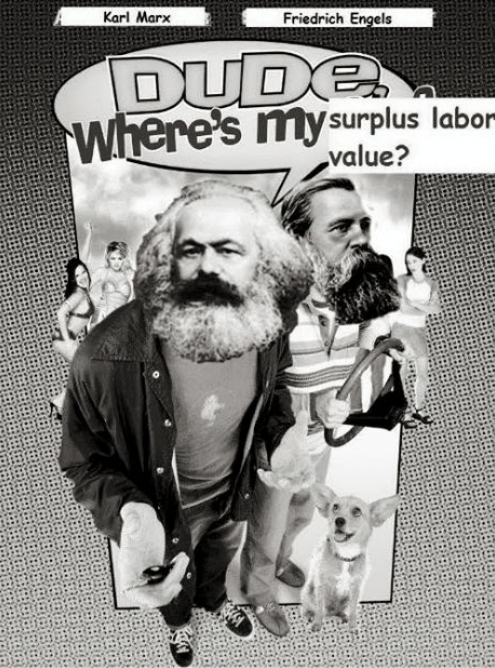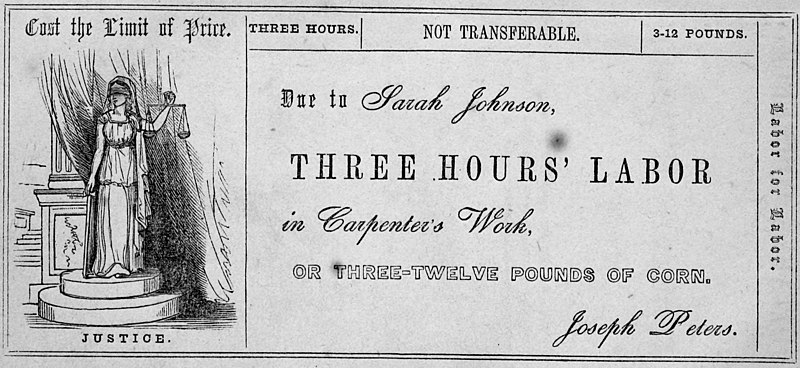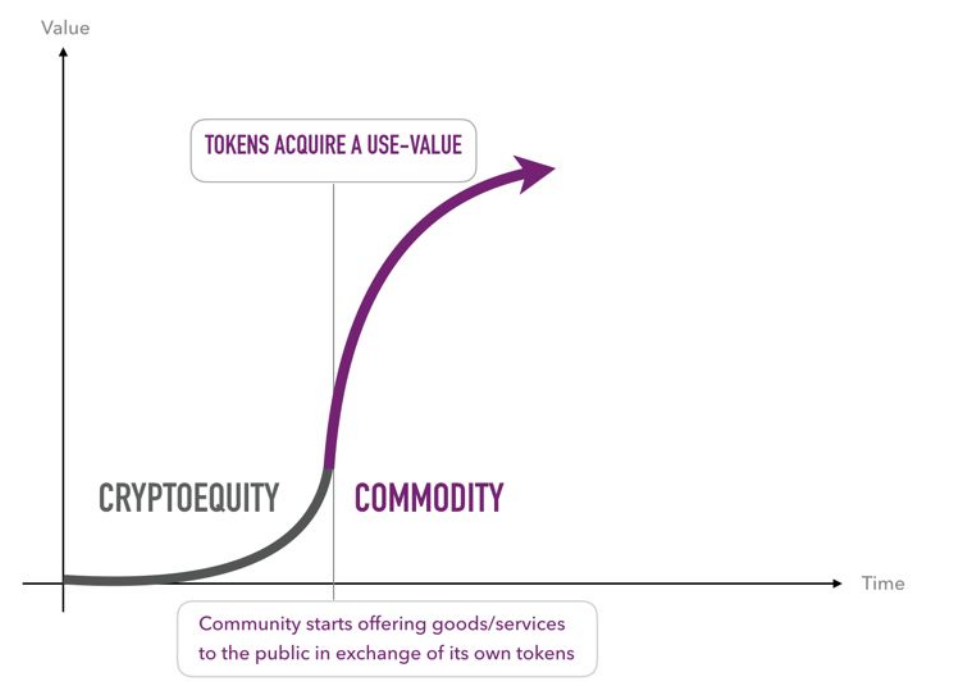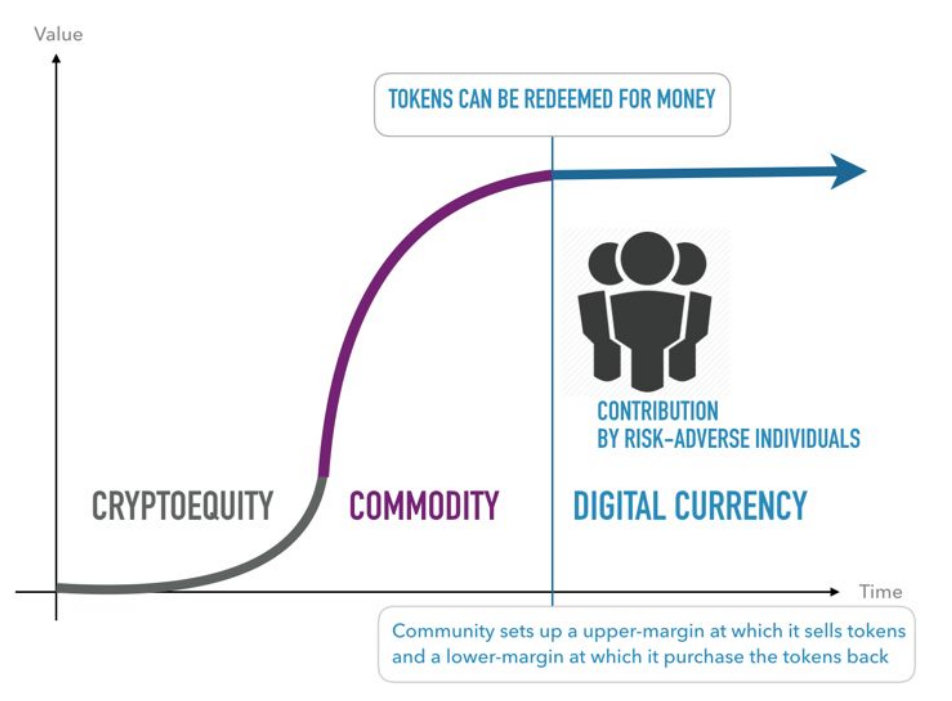Labor-value Token (LABOR)
website: https://labor-token.github.io/
Labour voucher used in “Modern Times” mutualist commune for a period of time in 1851, inspired by cost the limit of price, one of the first experiences in social currencies.
The labor theory of value (LTV) is a normative classical theory of value that argues that the price of a good or service should be (morally) equal to the total amount of labor value (wages) required to produce it.
wikipedia
Labour-Value token (LABOR) is a mutual debt and credit token through which we account for the labor and loans given to support the project and use it as payment method for internal cooperative tasks. LABOR allows participation in the Decentralized Cooperative DAO governance structure (DC), which is reserved for stakeholders and workers of the cooperative.
It is inspired by the classical theory of political economy and mutualist associations’ practices (taken with a pinch of salt) and has a double purpose: it is used as a system of open value accounting forming an alternative economic space and as a means to educate participants contributing work to use tokens and crypto-economic resources.
This token inaugurates a series of token-financial instruments issued by the cooperative fintech ecosystem for educational, utility, crowdfunding and mutual credit purposses only.
Tokenomic Model for Decentralised Cooperatives (DCs)
v2.5.9
With the aim of allowing the full development potential of the Ecofintech Coop project and at the same time offer a viable economic model that contributes to the launch and extension of new decentralized cooperatives and open collaborative networks, from the ecosystem we have designed a token-economic architecture that allows us the following functions:
– Bootstrap
– Mutual credit (open value accounting)
– Collective financing (crowdsale)
– Governance (DAO)
– Circular economy (digital currency)
By means of a consensual accounting of the value contributed in work to the cooperative space we generate a mutual credit with characteristics of monetary emission. In the initial start-up phase, the participants receive cryptographic tokens in the form of credit for hours of work contributed (Proof of Value) or deposited capital. In this first phase the token has the characteristics of shares in cryptoequity:
Images taken from the Backfeed Protocol white paper
Throughout a second phase, the project begins to develop and the token is used to access ecosystem services (utility) and listed in decentralized exchange houses. In this phase it acquires a commodity characteristic. It also gives rise to the appearance of an entry channel of external financing in the form of investment in currency supply (crowdsale).
In a third phase, once the ecosystem has consolidated and generates its own liquidity reserve, the decentralized cooperative can offer an internal exchange point to redeem the token for cash. In this phase the token acquires a clearer function as a bargaining chip and begins to stabilize its value thanks to the upper and lower margins set by the ecosystem participants based on market research. Faced with speculative movements that generate a rise in the price of the token on a bubble, the ecosystem can emit more money to the market, absorbing the surplus capitalization. Faced with possible price falls, the ecosystem would mark a lower margin of repurchase. In this way decentralized cooperatives acquire sovereignty over their own currency (digital currency), being able to relate to each other using a variety of tokens issued by different entities in the same trust network, giving rise to a true circular economy.
Commons Oriented Distributed Governance Protocol:
The decentralised cooperative governance system allows us to adapt the corporate DAO tool to the open value accounting and mutual credit model for decentralised cooperatives (DisCO and DC). Decision-making on issues concerning jointly managed funds, as well as the minting or burning of mutual credit and reputation tokens, will be determined by the contributed working relationship and supervision of the community itself. In a distributed cooperative organization and open value network we classify work into three categories:
– Commons oriented work .
– Subsistence work.
– Care or reproductive work.
Participants in the ecosystem will be able to carry out pro-common tasks on their own initiative, contributing voluntarily to the growth of the project and the extension of its services for the common good. The subsistence works will be those imperatives for the development of the economic activities of the cooperative, previously entrusted from the circle of direction. All token assignments must be approved by the participants using the DAO voting tool.
As care or reproductive work we understand those tasks that are fundamental for the reproduction and good emotional health of the project, as the Feminist Economicsi theory teaches us. Care work belongs to those participants in the ecosystem who are recognized as having carried out a special effort or extra work in addition to subsistence or pro-common work. This is to say, organizational tasks more based on concretions, connections and emotions that normally go unnoticed because they are difficult to measure and quantify following culturally masculine patterns such as accounting, analytical thinking and productivity.
Commons oriented and subsistence work is rewarded using a work time accounting token with monetary characteristics in the form of distributed digital accounting of mutual credit. Participants will be able to exchange their tokens among themselves for goods and services, as well as access liquidity through the decentralized cooperative’s internal exchange point (tokens received redeemed by the CD are “burned”, thus decreasing their amount in circulation).
The process can be carried out directly or through exchange houses. Its price, although initially determined by the co-operative’s consensus, may increase as the co-operative revalues (offering a higher exchange rate per hour worked) and market demand for the token/participation increases.
The cooperative’s common funds, obtained through the benefits of its economic activity, are used to offer change to participants who receive working time tokens and require cash settlement:
-
75% destined to exchange for subsistence jobs.
-
25% destined to exchange for commons oriented work.
The decentralised cooperative will design mechanisms to encourage the issued token to remain in circulation rather than being liquidated, for example by charging exchange fees or offering a token support bonus. The very loss of voting capacity due to token liquidation will create a balance, encouraging participants to avoid liquidating all their shares for cash, thus extracting value from the circular economy.
A non-exchangeable token with functions of reputation and meritocracy will be used as a record of the care and reproductive work provided.
The relationship between both tokens, working time and care work, is equivalent to the weight of decision in the cooperative’s decision-making processes, carried out using the voting DAO tool (Vote Weighting Holistic Protocol, see Tokenomic Whitepaper).
Different decentralised co-operatives acting in a trusted network within the same federation will ideally be able to use their mutual credit tokens to obtain goods and services from each other.
Confoederatio Platform:
We set up an infrastructure blockchain of governance and exchange in order to interconnect and allow self-administration, both of the sections that make up Ecofintech Coop, as well as of the different entities that in turn give rise to the confederated groupings or clusters. This infrastructure offers the DAO+DEX (decentralized exchange) functions of its own configuration, Confoederatio Platform. (Digital Infrastructure Axis and Financial Infrastructure Axis).
It is presented as the main development work of Ecofintech Coop and as a basic pillar on which to extend the network of nodes of the cooperative fintech ecosystem and associated independent actors. Within this structure, Ecofintech Coop is yet another federated cooperative, although it will maintain its own function of administration and maintenance service of the infrastructure as the technical-financial cooperative of the system, as well as the functions of promotion and education for members of new decentralised cooperatives as described above.
The platform will promote the establishment of fair and federated trade relations by creating an alternative digital economic space based on common values of decentralisation, fair business, sustainable economy, transparency, democratic autonomy and free market. It will allow the creation of internal federated markets for social and local currencies. At the same time, allows the association to acts as a common unified corporate body for the global external market, allowing the collective issuance of a variety of tokenized financial instruments.
The Ecofintech Coop’s WOT (web of trust) certified tokens are:
-
LABOR: Mutual credit token and bootstrap initial offering for federated DCs.
-
VALE: Association’ s voucher for WOCU exchange unit and liquidity accounting. (coming soon)
-
AMA: Ama-gi token commons oriented global mutual fund. (coming soon)
The Confoederatio platform will be deployed using RSK Rootstock technology in order to offer the highest standard in security, decentralization and resilience thanks to Bitcoin’s mining infrastructure. The common entity issuing tokenized financial instruments to the foreign market will be carried out on Ethereum to benefit from the extension of the erc20 standard in exchange houses and its wide acceptance by investors.
More info: https://ecofintech.noblogs.org/post/2018/10/28/confoederatio-trade/
*The Confoederatio platform was selected as one of the finalist projects in the 1st edition of the Ledger The Venture Builder for Human Centric Solutions competition.

*Marx develops in the Grundrisse fundamental aspects of his theory, such as money as a product of social relations and, in turn, the contradictions inherent in money itself and the different forms of money – possible forms of money, because in turn discards utopianisms and fantasies pointing out that there are coins that are impossible, such as currency labor time.
[cast]
Token de Valor-Trabajo (LABOR Labor-Value Token)
página web: https://labor-token.github.io/
La teoría del valor-trabajo (TVT) es una teoría de economía heterodoxa que considera que el valor de un bien o servicio está determinado por la cantidad de trabajo socialmente necesario para producirlo.
wikipedia
El token Valor Trabajo (LABOR) es un token de deuda y crédito mutuo a través del cual llevamos la contabilidad de los préstamos donados en apoyo al proyecto y es usado como método de pago para tareas internas de la cooperativa. LABOR permite la participación en la gobernanza y toma de decisiones de la cooperativa descentralizada (DACoop), la cual está reservada para las partes en interés y trabajadoras de la cooperativa.
Está inspirado por la teoría clásica de economía política y las prácticas asociativas mutualistas (en clave de humor) y tiene un doble propósito: es usado como un sistema de contabilidad de deuda interna generando un espacio económico propio y como forma de aprendizaje sobre el uso de tokens y recursos cripto-económicos para partcipantes que contribuyan con trabajo.
Este token inaugura una serie de instrumentos token-financieros emitidos por el ecosistema cooperativo fintech solo para fines educativos, de utilidad y como ejemplos de modelos de financiación colectiva y crédito mutuo.
Modelo de Economía Token para Cooperativas Descentralizadas (DCs)
Con el objetivo de permitir el pleno potencial de desarrollo del proyecto Ecofintech Coop y al mismo tiempo ofrecer un modelo económico viable que contribuya al lanzamiento y extensión de nuevas cooperativas descentralizadas y redes abiertas colaborativas, desde el ecosistema hemos diseñado una arquitectura token-económica que nos permita las siguientes funciones:
-
Arranque (bootstrap)
-
Crédito mutuo (open value accounting)
-
Financiación colectiva (crowdsale)
-
Gobernanza (DAO)
-
Economía circular (digital currency)
Mediante una contabilidad consensuada del valor aportado en trabajo al espacio cooperativo generamos un crédito mutuo con características de emisión monetaria. En la fase inicial de arranque las participantes reciben fichas criptográficas (tokens) en forma de crédito por horas de trabajo aportadas (Proof of Value) o capital depositado. En ésta primera fase el token tiene características de participaciones en cripto-capital social (cryptoequity):
Imágenes extraídas del documento técnico de Backfeed Protocol
A lo largo de una segunda fase, el proyecto comienza a desarrollarse y el token es usado para acceder a servicios del ecosistema (utility) y listado en casas de cambio descentralizadas. En ésta fase adquiere una característica de mercancía (commodity). También da lugar a la aparición de un canal de entrada de financiación externa en forma de inversión en oferta de moneda (crowdsale).
En una tercera fase, una vez el ecosistema se ha consolidado y genera su propia reserva de liquidez, la cooperativa descentralizada puede ofrecer un punto de cambio interno para redimir el token por efectivo. En ésta fase el token adquiere una función más clara como moneda de cambio y comienza a estabilizar su valor gracias a los márgenes superior e inferior marcados por las participantes en el ecosistema en base al estudio de mercado. Ante movimientos especulativos que generen una crecida en precio del token sobre una burbuja, el ecosistema puede emitir más masa monetaria al mercado, absorbiendo la capitalización excedente. Ante posibles caídas del precio, el ecosistema marcaría un margen inferior de recompra. De ésta forma las cooperativas descentralizadas adquieren soberanía sobre su propia moneda (digital currency), pudiendo relacionarse entre sí usando una variedad de tokens emitidos por las diferentes entidades en la misma red de confianza, dando lugar a una verdadera economía circular.
Protocolo de Gobernanza Distribuída Orientada al Pro-común:
El sistema de gobernanza cooperativa descentralizada nos permite adaptar la herramienta corporativa DAO al modelo de contabilidad abierta de valor y crédito mutuo para cooperativas descentralizadas (DisCO y DC). La capacidad de decisión en cuestiones concernientes a los fondos gestionados en común, así como el acuñado o quemado de tokens de crédito mutuo y reputación, vendrá determinada por la relación de trabajo aportado y la supervisión de la propia comunidad. En una organización cooperativa distribuida y red abierta de valor clasificamos el trabajo en tres categorías:
-
Trabajo pro-común .
-
Trabajo de subsistencia.
-
Trabajo de cuidados o reproductivo.
Participantes en el ecosistema podrán llevar a cabo tareas pro-común por libre iniciativa, contribuyendo de forma voluntaria al crecimiento del proyecto y extensión de sus servicios para el bien común. Los trabajos de subsistencia serán aquellos imperativos para el desarrollo de las actividades económicas de la cooperativa, encargados previamente desde el círculo de dirección. Todas las asignaciones de tokens deberán contar con la aprobación de las participantes mediante la herramienta de votación DAO.
Como trabajo de cuidados o reproductivo entendemos aquéllas tareas que son fundamentales para la reproducción y buena salud emocional del proyecto, tal y como nos enseña la teoría de la Economía Feministai. Los trabajos de cuidados pertenecen a aquéllas o aquéllos participantes en el ecosistema a quienes se les reconozca haber llevado a cabo un especial esfuerzo o trabajo extra adicional al trabajo de subsistencia o pro-común. Éste seguramente se exprese en áreas como buscar clientes y alianzas, gestionar proyectos, controlar la calidad, establecer relaciones, generar confianza, resolver conflictos, acompañar a nuevas participantes… es decir, tareas organizativas más basadas en concreciones, conexiones y emociones que normalmente pasan desapercibidas por ser difíciles de medir y cuantificar siguiendo patrones culturalmente masculinos como contabilidad, pensamiento analítico y productividad.
El trabajo pro-común y de subsistencia es retribuido usando un token de contabilidad de tiempo de trabajo con características monetarias en forma de contabilidad digital distribuída de crédito mutuo. Las participantes podrán intercambiar sus tokens entre ellos por bienes y servicios, así como acceder a liquidez mediante el punto de cambio interno de la cooperativa descentralizada (tokens recibidos redimidos por la DC son “quemados”, disminuyendo de ésta forma su cantidad en circulación).
El proceso podrá llevarse a cabo directamente o a través de casas de cambio. Su precio, si bien es determinado inicialmente por el consenso de la cooperativa, podrá aumentar según la cooperativa se revalorice (ofreciendo mayor precio al cambio por hora trabajada) y aumente la demanda en mercado por obtener el token/participación.
Los fondos comunes de la cooperativa, obtenidos mediante los beneficios de su actividad económica, son usados para ofrecer cambio a las participantes que reciben tokens de tiempo de trabajo y requieran su liquidación por efectivo:
-
75% destinado al cambio para trabajos de subsistencia.
-
25% destinado al cambio para trabajo pro-común.
La cooperativa descentralizada diseñará mecanismos para fomentar que el token emitido permanezca en circulación antes que ser liquidado, por ejemplo tasando unas comisiones al cambio u ofreciendo un bono al sostenimiento de token. La propia pérdida de capacidad de voto debido a la liquidación del token generará un equilibrio, fomentando que los y las participantes eviten liquidar todas sus participaciones por efectivo, extrayendo de ésta forma valor de la economía circular.
Como registro de cuenta del trabajo de cuidados y reproductivo aportado se usará un token no intercambiable con funciones de reputación y meritocracia.
La relación entre ambos tokens, tiempo de trabajo y trabajo de cuidados, equivale al peso de decisión en los procesos de decisión de la cooperativa, llevados a cabo mediante la herramienta DAO de votación (Protocolo Holístico de Ponderación de Voto, ver en el documento técnico tokenómico).
Diferentes cooperativas descentralizadas actuando en red de confianza dentro de la misma federación podrán, idealmente, usar sus tokens de crédito mutuo para obtener bienes y servicios unas de otras.
Plataforma Confoederatio:
Desplegamos una infraestructura blockchain de gobernanza e intercambio con el fin de interconectar y permitir la auto-administración, tanto de las secciones que conforman Ecofintech Coop, como de las diferentes entidades que a su vez dan lugar a las agrupaciones confederadas o cluster. Ésta infraestructura ofrece las funciones DAO+DEX (decentralized exchange) de configuración propia, Confoederatio Platform. (Eje de Infraestructura Digital y Eje de Infraestructura Financiera).
Se presenta como principal trabajo de desarrollo de Ecofintech Coop y como pilar básico sobre el que extender la propia red de nodos del ecosistema fintech cooperativo y de actores independientes asociados. Dentro de ésta estructura, Ecofintech Coop es una cooperativa federada más, si bien mantendrá la propia función de administración y servicio de mantenimiento de la infraestructura en calidad de cooperativa técnico-financiera del sistema, así como las funciones de promoción y educación para miembros de nuevas cooperativas descentralizadas como anteriormente hemos descrito.
La plataforma promoverá el establecimiento de relaciones comerciales justas y federadas creando un espacio económico digital alternativo basado en valores comunes de descentralización, negocios justos, economía sostenible, transparencia, autonomía democrática y mercado liberadoii. Permitirá crear mercados internos federados de monedas sociales y locales. A su vez permite a la asociación actuar como un cuerpo corporativo unificado común de cara al mercado global exterior, permitiendo la emisión como colectivo de una variedad de instrumentos financieros tokenizados.
Los tokens certificados en WOT (web of trust, red de confianza) de Ecofintech Coop son:
-
LABOR: Token de crédito mutuo y oferta de arranque inicial para DCs federadas.
-
VALE: Cupón de la asociación de contabilidad de unidad de cambio WOCU y liquidez. (próximamente)
-
AMA: Token Ama-gi de fondo mutuo global procomún. (próximamente)
La plataforma Confoederatio será desplegada utilizando la tecnología RSK Rootstock con el objetivo de ofrecer el estándar más alto en seguridad, descentralización y resiliencia gracias a la infraestructura de minería de Bitcoin. La entidad común de emisión de instrumentos financieros tokenizados al mercado exterior se llevará a cabo sobre Ethereum para beneficiarse de la extensión del estándar erc20 en casas de cambio y su amplia aceptación por parte de inversores.
Más información: https://ecofintech.noblogs.org/post/2018/10/28/confoederatio-trade/
La plataforma Confoederatio fué seleccionado como uno de los proyectos finalistas en la I edición de la competición Ledger The Venture Builder for Human Centric Solutions.

*Marx desarrolla en su obre Grundrisse aspectos fundamentales de su teoría, como el dinero como producto de las relaciones sociales y, a su vez, las contradicciones inherentes al dinero en sí mismo y las diferentes formas de dinero o posibles formas de dinero, porque a su vez descarta los utopismos y las fantasías señalando que hay monedas que son imposibles, como la moneda de tiempo de trabajo.



